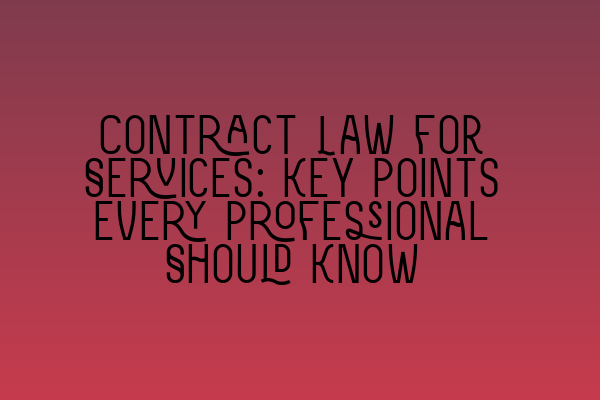Contract Law for Services: Key Points Every Professional Should Know
In the world of business, contracts are the backbone of legal relationships. As a professional offering services, understanding contract law is essential to protect your rights and ensure fair and enforceable agreements. In this blog post, we will explore some key points every professional should know about contract law for services.
1. The Importance of Written Contracts
When providing services, it is crucial to have a written contract in place. A written contract serves as evidence of the agreement between you and your client, and it outlines the rights and obligations of both parties. Without a written contract, disputes can arise, leading to confusion and potentially costly legal battles.
2. Essential Elements of a Contract
For a contract to be valid, it must contain certain essential elements. These elements include an offer, acceptance, consideration, mutual consent, and legal capacity. An offer is a proposal made by one party, while acceptance is the agreeing to the terms of the offer. Consideration refers to something of value exchanged between the parties, and mutual consent ensures that both parties are in agreement. Lastly, legal capacity refers to the ability of both parties to enter into a binding contract.
3. Clarity and Precision in Contract Language
Contracts must be drafted with clarity and precision to avoid any ambiguity or ambiguity that may lead to misunderstandings or disputes. Each clause should be drafted in clear and concise language that is easily understood by all parties involved. It is essential to use precise terminology and avoid any legal jargon that could confuse the reader.
4. Scope of Services and Deliverables
When drafting a contract for services, it is crucial to clearly define the scope of the services to be provided. This includes specifying the tasks, deliverables, deadlines, and any additional requirements. A well-defined scope of services helps to manage expectations and provides a clear understanding of the services to be rendered.
5. Payment Terms and Conditions
One of the most critical aspects of a service contract is the payment terms and conditions. This includes the pricing structure, payment method, invoicing procedures, and any applicable taxes or fees. Clearly outlining payment terms avoids future disputes and provides a fair and transparent process for both parties.
6. Confidentiality and Intellectual Property Rights
In some service contracts, confidentiality and intellectual property rights are crucial considerations. Confidentiality clauses protect sensitive information shared between the parties, while intellectual property clauses govern ownership and usage of any intellectual property created during the course of the services. These clauses play a vital role in protecting the rights and interests of both parties involved.
7. Termination and Dispute Resolution
Service contracts should include provisions for termination and dispute resolution. Termination clauses specify the conditions under which either party can terminate the contract, ensuring a fair and negotiated exit. Dispute resolution clauses outline the process for resolving any disputes that may arise, be it through negotiation, mediation, or arbitration.
In conclusion, understanding the key points of contract law for services is essential for professionals offering their expertise. From having a well-drafted written contract to clearly defining the scope of services, payment terms, and dispute resolution processes, a comprehensive contract protects your rights and helps avoid conflicts. Remember, seeking legal advice and assistance from a qualified solicitor is always advisable to ensure your contracts are legally sound and enforceable.
Related Articles:
– SQE 1 Practice Exam Questions
– SQE 1 Practice Mocks FLK1 FLK2
– SQE 2 Preparation Courses
– SQE 1 Preparation Courses
– SRA SQE Exam Dates
